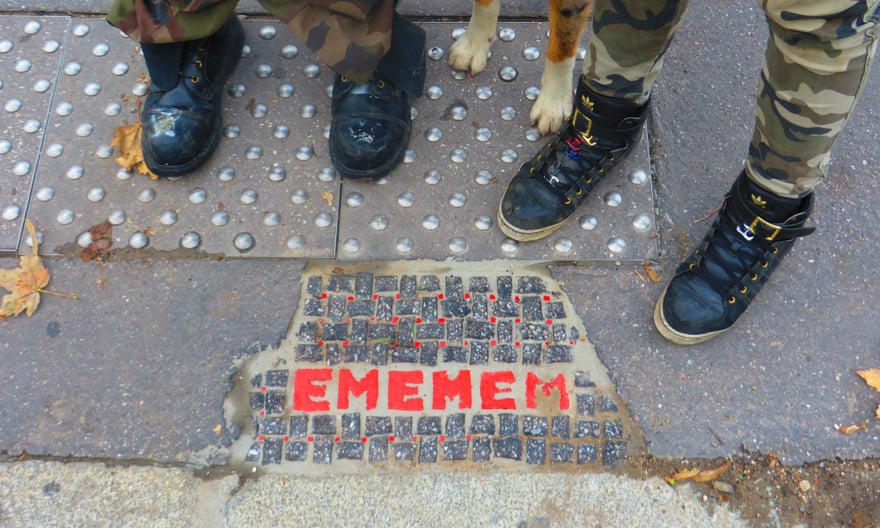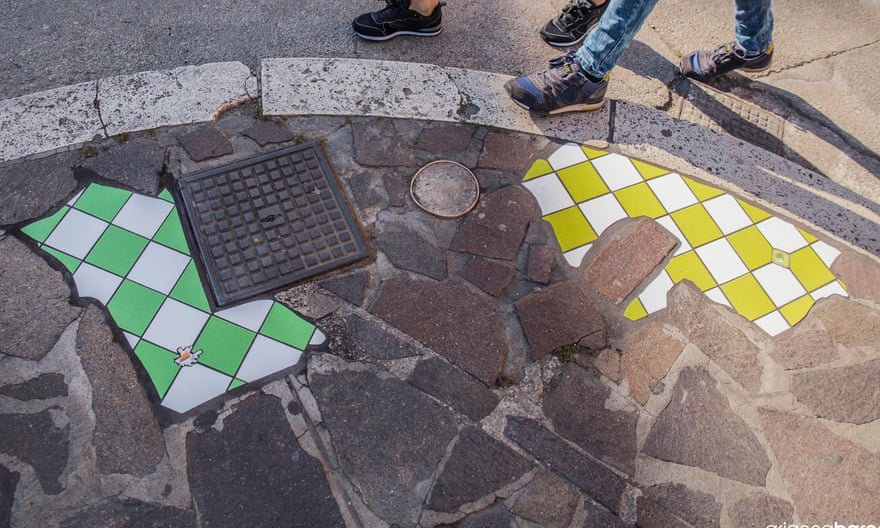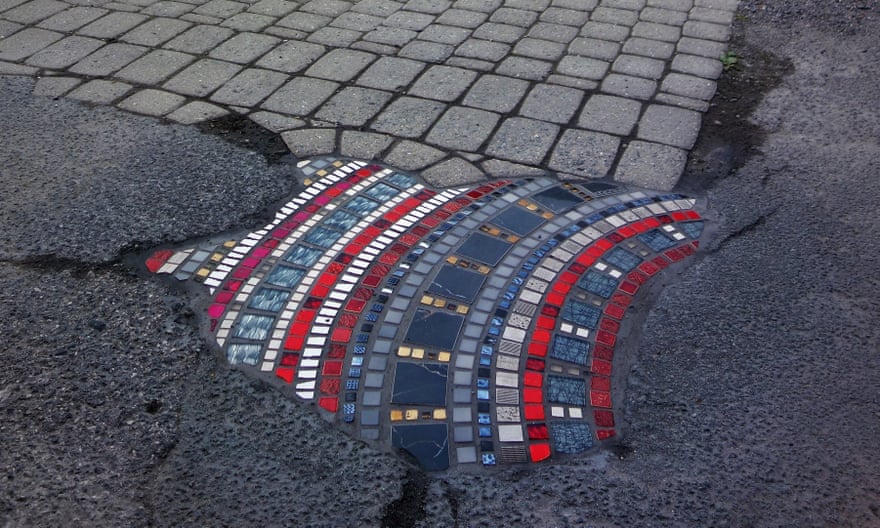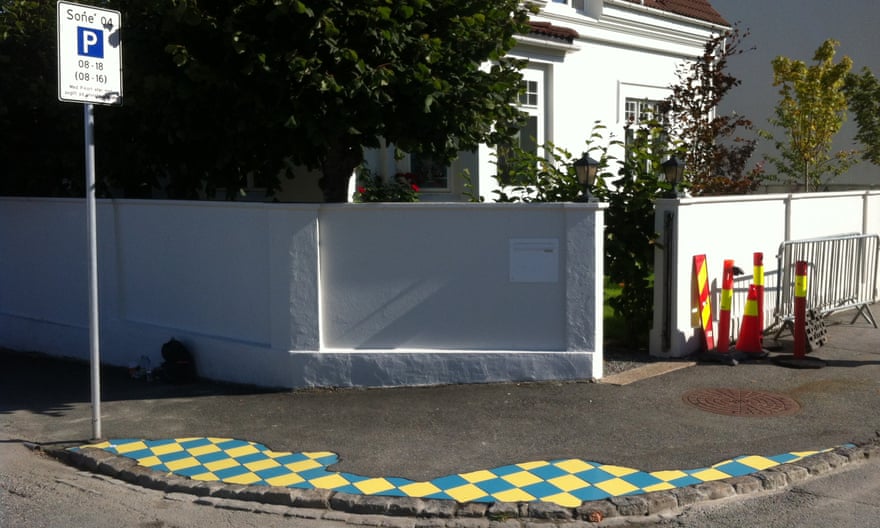Last year, the studio of the Lyon-based artist known as Ememem received an urgent call from an architectural firm close to the city’s Place Sathonay. Someone was in the process of dismantling a mosaic he had installed on the pavement in front of their offices. By the time he arrived, the culprit had fled with half of it.
That artwork may have partially disappeared, but many of Ememem’s other creations remain dotted throughout the municipality’s streets… some 350 and counting. Over the past six years, he has made a speciality of filling divots and potholes with multicoloured mosaics made from tiles of different sizes and different hues, arranged in striking geometric patterns. Some bear his signature, often in the form of an image of a trowel underscored by his name.
Ememem calls himself “the pavement surgeon” and “the pothole knight,” and refers to his artworks as “flackings” – a play on the French word flaque, which means puddle. He has written that the works are “a memory notebook of the city. It reveals what happened… Here, cobblestones have been picked up and thrown. There, a truck from the vegetable market tore off a piece of asphalt”.
His work has been drawing more and more attention in the city. A local website called HappyCurio spotlights walking tours of them and his Instagram account has 147,000 followers. “He’s a star of local street art,” says Lisa Mambré, deputy mayor of the Lyon’s 9th arrondissement. “His work is so noticeable. Everyone you ask seems to know about it.”
Yet while Ememem’s works may be very visible he, in contrast, is exceedingly elusive. Like his fellow street artist Banksy, he prefers to retain his anonymity. He refuses to be photographed and doesn’t give either phone or face-to-face interviews. Information about him is limited to a short biography and press kit on his official website (ememem-flacking.net). “It’s important for me to remain a little mysterious,” he has written. “And it’s also because I’m not very talented when it comes to social interactions.”

In order to discover a little more about this mysterious artist, I was forced to dig deeper and to reach out to a number of people who have been in touch with him – local politicians, a festival organiser, a gallery owner and even the manager of a tile showroom. Frustratingly, though, most had either never had any direct contact with him or were unwilling to reveal much about his identity, preferring to respect his desire for discretion.
One man who can offer some insight is his agent, Guillaume Abou, who has known him for some 15 years. He offers an intriguing description: “He’s someone with a great need to give and to share,” he says. “He’s quite laid-back, but has had a bit of a turbulent life.”
Someone else who has met him is Jeff Carpentier, the director of Planètes Carrelages in Amiens, in the north of France, where Ememem sourced tiles for a flacking he created as part of a local art festival called IC.ON.IC. “He’s discreet, but also very communicative and passionate about what he does,” he says.

The press kit on Ememem’s website notes that he was previously a songwriter with a well-known rock group, but there are no other clues. He has no formal artistic training and initially followed in his father’s footsteps by embarking on a career as a house tiler. Abou told me that he speaks French with a foreign accent and further research determined he is of Italian descent. As for the name Ememem, its origins remain enigmatic and Abou will only say, somewhat cryptically: “Even I don’t really know. It could come from the first letters of the title of Lou Reed’s worst-ever album, Metal Machine Music.”
Also slightly questionable is Ememem’s assertion that he invented the artform. If you search for “flacking” on YouTube, the first video that pops up is one on a Chicago-based artist called Jim Bachor, who has been filling potholes with mosaics since 2013, albeit with works in a much more figurative style. “Something similar has also existed in South America for quite some time,” notes Martine Blanchard, the founder of the Biennale Internationale de Mosaïque Contemporaine in Auray, Brittany.
What is certain is that Ememem created his first “flacking” in February 2016 in an alleyway in central Lyon. They soon became an obsession. “During the first years, he was completely frenetic,” says Abou. “He created at least two a week.” As the legality of his practice is rather fuzzy (he doesn’t ask for authorisation to intervene in the public space), he works exclusively at night. For added discretion, he sometimes adopts disguises or brings along props. Abou recalls how Ememem once dressed up as a plumber and also how he installed cones and red-and-white barrier tape around a pothole in Guadeloupe to give the impression he was doing legitimate work.

Although Ememem does next-to-no self-promotion, his celebrity is spreading way beyond the confines of Lyon. Martine Blanchard took inspiration from him to create 11 different flackings with groups of locals on the fringe of the Auray Biennale. “What I find particularly interesting is the way his creations resemble archaeological remains,” she says. Ememem himself has participated in an arts festival called Nuart in both Aberdeen and Stavanger, Norway, and has installed flackings in Madrid, Barcelona and Turin. He has also been approached by a Chilean architectural practice to work on a project in Santiago and Valparaíso.
He is gaining official recognition, too. The authorities of Lyon’s 9th arrondissement commissioned six “flackings” and gave followers of their Instagram account clues to track them down. The prestigious Galerie Italienne in Paris included several of his works in a show entitled Ceramics Now in 2021. Consisting of mosaic tiles laid on an asphalt base, they resemble portable “flackings” and sell for between €10,000 and €12,000. “He has a very strong gift for putting different colours together,” enthuses the gallery’s director, Alessandro Pron, who predicts a sparkling future for Ememem in the world of contemporary art.
Whoever he is and whatever his growing popularity brings, one thing is for sure: Ememem will continue to go out at night to beautify Lyon’s damaged roads and pavements. He sees his interventions not only as a service to the community, but also as a means of bringing enchantment to daily life. “The goal,” he writes, “is to spread a touch of poetry under the jaded soles of our shoes, to provoke a moment of amazement, a smile.”

